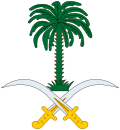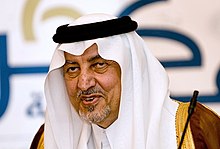
The House of Al Saud is the ruling royal family of Saudi Arabia. It is composed of the descendants of Muhammad bin Saud, founder of the Emirate of Diriyah, known as the First Saudi State (1727–1818), and his brothers, though the ruling faction of the family is primarily led by the descendants of Abdulaziz bin Abdul Rahman, the modern founder of Saudi Arabia. It forms a subtribe of the larger prominent ancient Banu Hanifa tribe of Arabia, from which well known 7th century Arabian theologist Maslama ibn Ḥabīb originates. The most influential position of the royal family is the King of Saudi Arabia, an absolute monarch. The family in total is estimated to comprise 15,000 members; however, the majority of power, influence and wealth is possessed by a group of about 2,000 of them. Some estimates of the royal family's wealth measure their net worth at $1.4 trillion. This figure includes the market capitalization of Saudi Aramco, the state oil and gas company, and its vast assets in fossil fuel reserves, making them the wealthiest family in the world and the wealthiest in recorded history.

The Mecca Province, officially Makkah Province, is one of the 13 provinces of Saudi Arabia. It is the third-largest province by area at 153,128 km2 (59,123 sq mi) and the most populous with a population of 8,557,766 as of 2017, of which 4,041,189 were foreign nationals and 4,516,577 were Saudis. It is located in the historic Hejaz region, and has an extended coastline on the Red Sea. Its capital is Mecca, the holiest city in Islam, and its largest city is Jeddah, which is Saudi Arabia's main port city. The province accounts for 26.29% of the population of Saudi Arabia and is named after the Islamic holy city of Mecca.
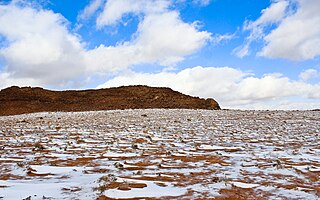
Tabuk is a province of Saudi Arabia, located along the northwestern coast of the country, facing Egypt across the Red Sea. It has an area of 146,072 km2 and a population of 910,030 (2017). Its capital is Tabuk. The governor is Fahd bin Sultan since 1987. In recent years, the province has received substantial media attention due to the Saudi government's planned Neom City project in the province.
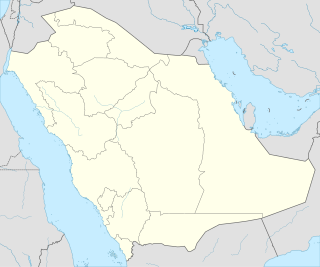
The provinces of Saudi Arabia, also known as regions, are the 13 first-level administrative divisions of the Kingdom of Saudi Arabia.
Faisal bin Turki Al Saud was the second ruler of the Second Saudi State and seventh head of the House of Saud.

Prince Ahmed bin Abdulaziz Al Saud is a member of House of Saud who served as deputy minister of interior from 1975 to 2012 and briefly as minister of interior in 2012. He was detained in March 2020 on the orders of his brother and nephew, King Salman and Crown Prince Mohammed bin Salman, respectively, and charged with treason.

Khalid bin Faisal Al Saud, commonly known as Khalid Al-Faisal, is a Saudi Arabian politician, artist, and poet who is the governor of Makkah Province, in office from 2007 to 2013 and again since 2015. He was the Saudi minister of education from 2013 to 2015. He was also the governor of Asir Province from 1971 to 2007. He served as the adviser to King Salman.

The Emirate of Nejd or Imamate of Nejd, also known as the second Saudi state was existing between 1824 and 1891 in Nejd, the regions of Riyadh and Ha'il of what is now Saudi Arabia. Saudi rule was restored to central and eastern Arabia after the Emirate of Diriyah, the first Saudi state, having previously been brought down by the Ottoman Empire's Egypt Eyalet in the Ottoman–Wahhabi War (1811–1818).

The order of succession to the Saudi Arabian throne is determined by, and within, the House of Saud. Every King of Saudi Arabia, upon his death, has been succeeded by the crown prince, with a new crown prince then being appointed according to a loose form of agnatic seniority among the sons of Ibn Saud, though various members of the family have been bypassed for various reasons. A deputy crown prince was first selected in 2014.

Mishaal bin Abdulaziz Al Saud was a Saudi Arabian politician and businessman. A member of the House of Saud, he held different cabinet posts in the 1950s and was the chairman of the Allegiance Council from 2007 to 2017.

Bandar bin Abdulaziz Al Saud was the tenth son of King Abdulaziz. At the time of his death, he was the eldest surviving member of the Saudi ruling family.
Sultan bin Bajad bin Humaid al-'Utaybi was the Sheikh of the Otaibah tribe and one of the prominent leaders of the Ikhwan movement in the Arabian Peninsula. This tribal army supported King Abdulaziz in his efforts to unify Saudi Arabia between 1910 and 1927.
Saud bin Abdul Muhsin Al Saud is a Saudi royal, diplomat, and former politician. He served as the governor of Ha'il Province between 1999 and April 2017. In March 2021 he was appointed Saudi ambassador to Portugal.
Mishaal bin Abdullah Al Saud is a Saudi prince, diplomat, and politician. Mishaal is a son of former King Abdullah. He served as the governor of Najran Province (2009–2013) and then as the governor of Mecca Province (2013–2015).
Fahd bin Sultan Al Saud has been the governor of Tabuk Province since 1987 and a member of House of Saud.
Saud bin Khalid Al Faisal is the former deputy governor of Saudi Arabian General Investment Authority (SAGIA) and a member of House of Saud. He is the deputy governor of Al Madinah Region.
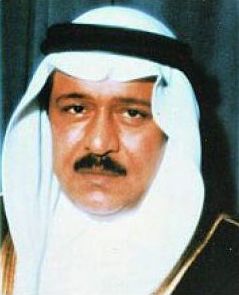
Muhammed bin Saud Al Saud was a Saudi royal and politician. He was a son of King Saud. He served as the Saudi Arabian minister of defense from 1960 to 1962 during his father's reign. Later Prince Muhammed was the governor of Al Bahah Province from 1987 to 2010.

Faisal bin Turki I Al Saud was a Saudi royal and politician. He was the only son of Prince Turki I and the eldest grandson of King Abdulaziz. He served as minister of interior during the reign of King Saud, his uncle and step-father, and was the country's first minister of labour and social affairs. Although he was very close to King Saud, Prince Faisal was one of the Saudi royals who signed the document that asked Saud to abdicate in 1964.

The Ministry of Education(MoE) (Arabic: وزارة التعليم), before 2003 as the Ministry of Knowledge and until 1953 as the Directorate of Knowledge, is a government ministry in Saudi Arabia that is responsible for regulating primary, secondary and higher education in the country. It was established in 1926 by King Abdulaziz ibn Saud in the Kingdom of Nejd and Hejaz. Since the amalgamations of the General Presidency for Girls' Education (GPGE) in 2002 and the Ministry of Higher Education (MOHE) in 2015, it became the sole body which supervises all schools, universities and colleges in the country.

Abdulaziz bin Abdul Rahman Al Saud (1875–1953), the founder and first king of Saudi Arabia, also called Ibn Saud, was very young when he first got married. However, his wife died shortly after their marriage. Ibn Saud remarried at eighteen and his firstborn child was Prince Turki I. He had 45 sons of whom 36 survived to adulthood and had children of their own. He also had many daughters. He is thought to have had 22 wives.
